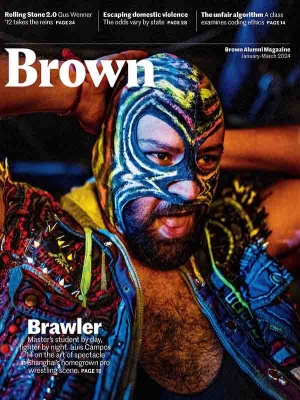After receiving her master’s in old world archaeology and art, Lena Sisco ’97 AM envisioned herself as an Indiana Jones rather than a James Bond. But jobs in archaeology were hard to find and she sought adventure, so she signed up for a six-year stint in the Navy reserves.
Growing up, Sisco says she always had an intuitive streak—she remembers knowing a relative was sick before they did. A Navy commander urged her to apply for a new year-long Navy training program, only recently opened to women, called “Interrogating Prisoners of War.”
Sisco mastered 19 “approach techniques,” including psychological tactics to intimidate a detainee into handing over valuable information. She became an expert in reading body language and managing her own: to convey openness, don’t cross your arms, cover your neck, play with your hair, or fidget. Orient your navel and feet to face the other person.
In 2002 she was stationed for six months at Guantanamo’s Camp Delta. She threw out rigid, unproductive strategies reminiscent of “Good Cop, Bad Cop” and focused on forming sincere connections with people believed to have contributed to the deaths of nearly 3,000 people on American soil.
“If I wanted the detainee just to open up and talk to me I had to answer two questions: What’s going to motivate them to talk to me? And what do they need once they do?” she says.
She found small acts of kindness prompted trust and embraced a non-accusatory, empathy-led approach that she continues to champion. She has honed her interrogation tactics to apply in civilian life, teaching rapport-building and deception-detection for her consulting firms Congruency Group and Sector Intelligence Group. Her 2022 book Honest Answers: Interview and Negotiation Skills to Get to the Truth—her third—teaches concepts like “elicitation” (collecting information without drawing attention to what is being sought) and “duping delight,” in which the thrill of successfully lying leaks into body language. There’s also the practice of surreptitious quid pro quo, sharing something about yourself to induce another to reciprocate. And she swears by “liar’s number three,” or the tendency of a duplicitous narrative to rely on groups of three (people, things, etc.) as they are easy to remember amidst the cognitive stress of lying.
Sisco’s clients include military special forces and government agencies, but also civilian sales people, corporate executives, medical practitioners, and anyone interested in learning how to ask better, smarter questions. “No matter what industry you work in, you need information, whether to make a critical decision to keep yourself safe, use your money wisely, lead people, or build trust,” Sisco says.





